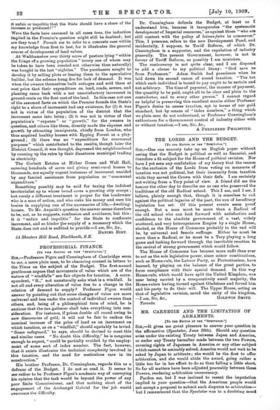PROFESSORIAL FINANCE. tTo TEM carton 01 TUN 'HPBUrATOILl
SIR,—Professors Pigou and Cunningham of Cambridge seem to me, a mere plain man, to be obscuring counsel in letters to the Times on the subject of the Budget. The first-named gentleman argues that movements of value which are of the nature of "windfalls" are fair objects for taxation. A corre- spondent, "R.," not unnaturally asks what is a windfall. Is not all and every alteration of value due to a change in the relation of demand to supply ? Professor Pigou would answer by pointing out that some changes of value are more universal and less under the control of individual owners than others, and, being of a philosophical turn of mind, he is anxious that the tax-gatherer shall take everything into con- sideration. For instance, if prices double all round owing to new discoveries of gold, it will not be fair to reckon the nominal increase of the price of land as an increment on which taxation, as on a "windfall," should equitably be levied. "Some safeguard," he says, should be devised to meet this and similar cases. "No doubt this difficulty," he is sanguine enough to expect, "could be partially avoided by the employ- ment of some sort of index number. The fact, however, that it exists illustrates the technical complexity involved in this taxation, and the need for meticulous care in its construction."
His brother Professor, Dr. Cunningham, regards this as a defence of the Budget. I do not so read it. It seems to me rather to be Professor Pigou's academic way of conveying his opinion that the task would be beyond the power of any poor finite Commissioner, and that nothing short of the engagement of the Archangel Gabriel for the^ job would overcome the difficulty. Dr. Cunningham defends the Budget, at least so I understand him, because it inaugurates "the systematic development of Imperial resources," as against those "who are still content with the policy of laissez-faire in commerce." This, I presume, refers to the new Development Fund, and incidentally, I suppose, to Tariff Reform, of which Dr. Cunningham is a supporter, and the regulation of industry generally. The present Government, however, is not in favour of Tariff Reform, so possibly I am mistaken.
The controversy is not quite clear, and I am disposed to add a clause to my political litany : "God save us from Professors." Adam Smith had prescience when he laid down his second canon of sound taxation. "The tax which each individual is bound to pay ought to be certain and not arbitrary. The time of payment, the manner of payment, the quantity to be paid, ought all to be clear and plain to the contributor, and to every other person." I cannot regard as helpful in preserving this excellent maxim either Professor Pigou's desire to assess taxation, not in terms of our gold standard, but by means of "index numbers," a thing which we plain men do not understand, or Professor Cunningham's enthusiasm for a Government control of industry either with or without taxation.—I am, Sir, &c., A PERPLEXED PHILISTINE.










































 Previous page
Previous page